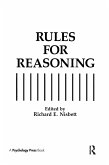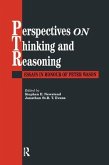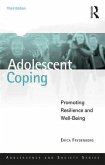Gary G. Ford
Ethical Reasoning for Mental Health Professionals
Gary G. Ford
Ethical Reasoning for Mental Health Professionals
- Broschiertes Buch
- Merkliste
- Auf die Merkliste
- Bewerten Bewerten
- Teilen
- Produkt teilen
- Produkterinnerung
- Produkterinnerung
This core textbook not only provides ethical and legal issues, along with representative case studies, it also-and more importantly-helps students to develop their own framework for ethical reasoning. The author surveys various methods of ethical reasoning and then helps students to apply ethical principles to novel professional circumstances. Features & Benefits: - Survey of major principles and methods of ethical reasoning; - Innovative framework to support individual ethical reasoning and decision making; - A comprehensive presentation of ethical issues pertaining to therapy, assessment,…mehr
Andere Kunden interessierten sich auch für
![Hypnotism for Professionals Hypnotism for Professionals]() Konradi LeitnerHypnotism for Professionals14,99 €
Konradi LeitnerHypnotism for Professionals14,99 €![Writing to Clients and Referring Professionals about Psychological Assessment Results Writing to Clients and Referring Professionals about Psychological Assessment Results]() J. B. AllynWriting to Clients and Referring Professionals about Psychological Assessment Results69,99 €
J. B. AllynWriting to Clients and Referring Professionals about Psychological Assessment Results69,99 €![Rules for Reasoning Rules for Reasoning]() Rules for Reasoning92,99 €
Rules for Reasoning92,99 €![Perspectives On Thinking And Reasoning Perspectives On Thinking And Reasoning]() Perspectives On Thinking And Reasoning68,99 €
Perspectives On Thinking And Reasoning68,99 €![Adolescent Coping Adolescent Coping]() Erica FrydenbergAdolescent Coping60,99 €
Erica FrydenbergAdolescent Coping60,99 €![The Psychology of Deductive Reasoning (Psychology Revivals) The Psychology of Deductive Reasoning (Psychology Revivals)]() Jonathan St. B. T. EvansThe Psychology of Deductive Reasoning (Psychology Revivals)73,99 €
Jonathan St. B. T. EvansThe Psychology of Deductive Reasoning (Psychology Revivals)73,99 €![Thinking and Reasoning (Psychology Revivals) Thinking and Reasoning (Psychology Revivals)]() Thinking and Reasoning (Psychology Revivals)31,99 €
Thinking and Reasoning (Psychology Revivals)31,99 €-
-
-
This core textbook not only provides ethical and legal issues, along with representative case studies, it also-and more importantly-helps students to develop their own framework for ethical reasoning. The author surveys various methods of ethical reasoning and then helps students to apply ethical principles to novel professional circumstances. Features & Benefits: - Survey of major principles and methods of ethical reasoning; - Innovative framework to support individual ethical reasoning and decision making; - A comprehensive presentation of ethical issues pertaining to therapy, assessment, industrial/organizational work, teaching, and research; - A cutting edge chapter on ethics and the use of technology in clinical practice; - Numerous case situations to exemplify ethical dilemmas and ethical responses; - Inclusion of ethical codes pertaining to both counseling and psychotherapy.
Hinweis: Dieser Artikel kann nur an eine deutsche Lieferadresse ausgeliefert werden.
Hinweis: Dieser Artikel kann nur an eine deutsche Lieferadresse ausgeliefert werden.
Produktdetails
- Produktdetails
- Verlag: Sage Publications, Inc.
- Seitenzahl: 408
- Erscheinungstermin: 1. Januar 2006
- Englisch
- Abmessung: 235mm x 191mm x 22mm
- Gewicht: 759g
- ISBN-13: 9780761930945
- ISBN-10: 0761930949
- Artikelnr.: 20960118
- Herstellerkennzeichnung
- Libri GmbH
- Europaallee 1
- 36244 Bad Hersfeld
- gpsr@libri.de
- Verlag: Sage Publications, Inc.
- Seitenzahl: 408
- Erscheinungstermin: 1. Januar 2006
- Englisch
- Abmessung: 235mm x 191mm x 22mm
- Gewicht: 759g
- ISBN-13: 9780761930945
- ISBN-10: 0761930949
- Artikelnr.: 20960118
- Herstellerkennzeichnung
- Libri GmbH
- Europaallee 1
- 36244 Bad Hersfeld
- gpsr@libri.de
Gary G. Ford, Ph.D., is a professor in the Department of Psychology at Stephen F. Austin State University. He teaches both undergraduate and graduate courses, such as professional ethics, theories of personality, personality assessment, history and systems of psychology, human consciousness, existential psychology, and psychopathology. He is also actively involved in providing practicum supervision in the clinical psychology graduate program. Among the areas he has published in previously are professional ethics, substance abuse, psychological defense, existential psychology, and sports psychology. He served on the Editorial Board of Journal of Research in Personality for six years. Dr. Ford received his Ph.D. in clinical psychology from Fordham University, Bronx, New York, and his M.A. in philosophy from the University of Illinois at Urbana-Champaign. His interdisciplinary academic background in philosophy and psychology has provided him with a unique perspective on the complex task of developing an ethics book for mental health professionals that will enable them to reason effectively when confronted with the ethical conflicts that invariably arise in their professional practice. He has been a licensed clinical psychologist for nearly 20 years and has been affiliated with Veterans Administration Medical Centers and worked in private practice. He has served on IRBs and ethics committees in both hospital and university settings. He has administered psychology licensing examinations as an Oral Examiner for the Texas State Board of Examiners of Psychologists and conducted continuing education workshops in professional ethics.
Preface Ch 1. Introduction What is Ethics Ethics and Personal Values The Role and Values in the Practice of a Mental Health Profession Why do Professions Develop Ethical Standards? The History of Ethics in Psychology "Ethical Principals of Psychologists and Code of Conduct" Counseling: Code of Ethics Psychiatry: The Principles of Medical Ethics, With Annotations Especially Applicable to Psychiatry Social Work: Code of Ethics of the National Association of Social Workers The Limitations of Ethical Codes Ethics and Law Summary Ch 2. "Ethical Principles of Psychologists and Code of Conduct" Introduction and Applicability Preamble General Principles Summary Ch 3. Counseling
s Code of Ethics Preamble ACA Code of Ethics Sections The Existence of Ethical Conflict Summary Ch 4. Models of Ethical Reasoning and Their Effectiveness in Resolving Ethical Conflict The Philosophical Basis of Ethical Judgments Utilitarianism Kant
s Formalist Ethical Theory The Need for Ethical Problem-Solving Skills to Address Conflicts Between Ethical Principles Ethical Relativism Ethical Contextualism Summary Ch 5: A Model of the Ethical Decision-Making Process The Purpose of the Model The Model A Case Example Applying the Model of Ethical Decision Making Summary Ch 6: Ethical Issues in Psychotherapy and Counseling Informed Consent Confidentiality Multiple Relationships Conflict of Interest Competence Respect for Clients
Autonomy Termination Practice Case Involving the Model of Ethical Decision Making Summary Ch 7: Organizational Settings and Special Populations Working Within an Organization Conflict of Interest Working in a Psychiatric Hospital Managed Care Practice Working in Forensic (Correctional) Settings Mental Health Professionals in the Military Psychotherapy With Children School Psychology and Counseling Practice Case Involving the Model of Ethical Decision Making Summary Ch 8: Ethical Issues in Assessment and Testing The Value and Ethical Implications of Psychiatric Diagnoses Psychological and Educational Assessment and Testing Multicultural Issues in Psychological Assessment Ethics and Test Validity Use of Computerized Test Administration, Scoring, and Interpretation Report Writing Special Considerations in College Orientation Testing Practice Case Involving the Model of Ethical Decision Making Summary Ch 9: The Use of Computer Technology in Professional Practice Specialty Guidelines for E-Therapy Beneficence Nonmaleficence Integrity Competence Informed consent Confidentiality Conducting Assessments Using the Internet Conclusion Practice Case Involving the Model of Ethical Decision Making Summary Ch 10: Practice and Assessment in Organizational and Business Settings Working for a Business Organization Competence Consulting Relationships Special Considerations in Industrial/Organizational Assessment Entrepreneurial Practice of a Mental Health Profession Practice Case Involving the Model of Ethical Decision Making Summary CH 11: Ethical Issues in Teaching and Supervision Competence Informed Consent Multiple Relationships Confidentiality Professional and Scientific Responsibility Teaching Students About Values and Professional Ethics Ethical and Legal Issues in Supervision Practice Case Involving the Model of Ethical Decision Making Summary Ch 12: Ethical Issues in Research Ethics, Values, and Theory Construction Conducting Research With Human Participants Protecting Research Participants From Harm Informed Consent Special Considerations in Conducting Research With Children The Use of Deception in Research Confidentiality Ethical Issues Concerning the Use of Student Subject Pools Ethics and Scientific Merit of Research Ethical Issues in Data Collection and Analysis Ethical Issues in Publishing Research Results Ethical Issues in Conducting Research on the Internet Ethical Issues in Conducting Animal Research Practice Case Involving the Model of Ethical Decision Making Summary Ch 13: Mental Health Professions and the Law Legal Issues in Hospital Admission for Psychiatric Treatment Involuntary Hospitalizations: The Psychiatric Commitment Process The Rights of Psychiatric Inpatient Clients Ethical Considerations in Suicide Preventions Forensic Practice in the Mental Health Professions What if Ethics and the Law Conflict? Practice Case Involving the Model of Ethical Decision Making Summary Ch 14: State Boards, Ethics Committees, and Ethics Complaints When Professionals Identify Unethical Conduct State Boards of Psychology and Counseling Professional Organizations
Ethics Committees Dealing Appropriately With a State Board of Ethics Committee Inquiry Legal Complaints Against Mental Health Professionals Avoiding Difficulties by Functioning as an Ethical Professional Practice Case Involving the Model of Ethical Decision Makings Summary References Appendices A: "Ethical Principles of Psychologists and Code of Conduct" B: ACA Code of Ethics
s Code of Ethics Preamble ACA Code of Ethics Sections The Existence of Ethical Conflict Summary Ch 4. Models of Ethical Reasoning and Their Effectiveness in Resolving Ethical Conflict The Philosophical Basis of Ethical Judgments Utilitarianism Kant
s Formalist Ethical Theory The Need for Ethical Problem-Solving Skills to Address Conflicts Between Ethical Principles Ethical Relativism Ethical Contextualism Summary Ch 5: A Model of the Ethical Decision-Making Process The Purpose of the Model The Model A Case Example Applying the Model of Ethical Decision Making Summary Ch 6: Ethical Issues in Psychotherapy and Counseling Informed Consent Confidentiality Multiple Relationships Conflict of Interest Competence Respect for Clients
Autonomy Termination Practice Case Involving the Model of Ethical Decision Making Summary Ch 7: Organizational Settings and Special Populations Working Within an Organization Conflict of Interest Working in a Psychiatric Hospital Managed Care Practice Working in Forensic (Correctional) Settings Mental Health Professionals in the Military Psychotherapy With Children School Psychology and Counseling Practice Case Involving the Model of Ethical Decision Making Summary Ch 8: Ethical Issues in Assessment and Testing The Value and Ethical Implications of Psychiatric Diagnoses Psychological and Educational Assessment and Testing Multicultural Issues in Psychological Assessment Ethics and Test Validity Use of Computerized Test Administration, Scoring, and Interpretation Report Writing Special Considerations in College Orientation Testing Practice Case Involving the Model of Ethical Decision Making Summary Ch 9: The Use of Computer Technology in Professional Practice Specialty Guidelines for E-Therapy Beneficence Nonmaleficence Integrity Competence Informed consent Confidentiality Conducting Assessments Using the Internet Conclusion Practice Case Involving the Model of Ethical Decision Making Summary Ch 10: Practice and Assessment in Organizational and Business Settings Working for a Business Organization Competence Consulting Relationships Special Considerations in Industrial/Organizational Assessment Entrepreneurial Practice of a Mental Health Profession Practice Case Involving the Model of Ethical Decision Making Summary CH 11: Ethical Issues in Teaching and Supervision Competence Informed Consent Multiple Relationships Confidentiality Professional and Scientific Responsibility Teaching Students About Values and Professional Ethics Ethical and Legal Issues in Supervision Practice Case Involving the Model of Ethical Decision Making Summary Ch 12: Ethical Issues in Research Ethics, Values, and Theory Construction Conducting Research With Human Participants Protecting Research Participants From Harm Informed Consent Special Considerations in Conducting Research With Children The Use of Deception in Research Confidentiality Ethical Issues Concerning the Use of Student Subject Pools Ethics and Scientific Merit of Research Ethical Issues in Data Collection and Analysis Ethical Issues in Publishing Research Results Ethical Issues in Conducting Research on the Internet Ethical Issues in Conducting Animal Research Practice Case Involving the Model of Ethical Decision Making Summary Ch 13: Mental Health Professions and the Law Legal Issues in Hospital Admission for Psychiatric Treatment Involuntary Hospitalizations: The Psychiatric Commitment Process The Rights of Psychiatric Inpatient Clients Ethical Considerations in Suicide Preventions Forensic Practice in the Mental Health Professions What if Ethics and the Law Conflict? Practice Case Involving the Model of Ethical Decision Making Summary Ch 14: State Boards, Ethics Committees, and Ethics Complaints When Professionals Identify Unethical Conduct State Boards of Psychology and Counseling Professional Organizations
Ethics Committees Dealing Appropriately With a State Board of Ethics Committee Inquiry Legal Complaints Against Mental Health Professionals Avoiding Difficulties by Functioning as an Ethical Professional Practice Case Involving the Model of Ethical Decision Makings Summary References Appendices A: "Ethical Principles of Psychologists and Code of Conduct" B: ACA Code of Ethics
Preface Ch 1. Introduction What is Ethics Ethics and Personal Values The Role and Values in the Practice of a Mental Health Profession Why do Professions Develop Ethical Standards? The History of Ethics in Psychology "Ethical Principals of Psychologists and Code of Conduct" Counseling: Code of Ethics Psychiatry: The Principles of Medical Ethics, With Annotations Especially Applicable to Psychiatry Social Work: Code of Ethics of the National Association of Social Workers The Limitations of Ethical Codes Ethics and Law Summary Ch 2. "Ethical Principles of Psychologists and Code of Conduct" Introduction and Applicability Preamble General Principles Summary Ch 3. Counseling
s Code of Ethics Preamble ACA Code of Ethics Sections The Existence of Ethical Conflict Summary Ch 4. Models of Ethical Reasoning and Their Effectiveness in Resolving Ethical Conflict The Philosophical Basis of Ethical Judgments Utilitarianism Kant
s Formalist Ethical Theory The Need for Ethical Problem-Solving Skills to Address Conflicts Between Ethical Principles Ethical Relativism Ethical Contextualism Summary Ch 5: A Model of the Ethical Decision-Making Process The Purpose of the Model The Model A Case Example Applying the Model of Ethical Decision Making Summary Ch 6: Ethical Issues in Psychotherapy and Counseling Informed Consent Confidentiality Multiple Relationships Conflict of Interest Competence Respect for Clients
Autonomy Termination Practice Case Involving the Model of Ethical Decision Making Summary Ch 7: Organizational Settings and Special Populations Working Within an Organization Conflict of Interest Working in a Psychiatric Hospital Managed Care Practice Working in Forensic (Correctional) Settings Mental Health Professionals in the Military Psychotherapy With Children School Psychology and Counseling Practice Case Involving the Model of Ethical Decision Making Summary Ch 8: Ethical Issues in Assessment and Testing The Value and Ethical Implications of Psychiatric Diagnoses Psychological and Educational Assessment and Testing Multicultural Issues in Psychological Assessment Ethics and Test Validity Use of Computerized Test Administration, Scoring, and Interpretation Report Writing Special Considerations in College Orientation Testing Practice Case Involving the Model of Ethical Decision Making Summary Ch 9: The Use of Computer Technology in Professional Practice Specialty Guidelines for E-Therapy Beneficence Nonmaleficence Integrity Competence Informed consent Confidentiality Conducting Assessments Using the Internet Conclusion Practice Case Involving the Model of Ethical Decision Making Summary Ch 10: Practice and Assessment in Organizational and Business Settings Working for a Business Organization Competence Consulting Relationships Special Considerations in Industrial/Organizational Assessment Entrepreneurial Practice of a Mental Health Profession Practice Case Involving the Model of Ethical Decision Making Summary CH 11: Ethical Issues in Teaching and Supervision Competence Informed Consent Multiple Relationships Confidentiality Professional and Scientific Responsibility Teaching Students About Values and Professional Ethics Ethical and Legal Issues in Supervision Practice Case Involving the Model of Ethical Decision Making Summary Ch 12: Ethical Issues in Research Ethics, Values, and Theory Construction Conducting Research With Human Participants Protecting Research Participants From Harm Informed Consent Special Considerations in Conducting Research With Children The Use of Deception in Research Confidentiality Ethical Issues Concerning the Use of Student Subject Pools Ethics and Scientific Merit of Research Ethical Issues in Data Collection and Analysis Ethical Issues in Publishing Research Results Ethical Issues in Conducting Research on the Internet Ethical Issues in Conducting Animal Research Practice Case Involving the Model of Ethical Decision Making Summary Ch 13: Mental Health Professions and the Law Legal Issues in Hospital Admission for Psychiatric Treatment Involuntary Hospitalizations: The Psychiatric Commitment Process The Rights of Psychiatric Inpatient Clients Ethical Considerations in Suicide Preventions Forensic Practice in the Mental Health Professions What if Ethics and the Law Conflict? Practice Case Involving the Model of Ethical Decision Making Summary Ch 14: State Boards, Ethics Committees, and Ethics Complaints When Professionals Identify Unethical Conduct State Boards of Psychology and Counseling Professional Organizations
Ethics Committees Dealing Appropriately With a State Board of Ethics Committee Inquiry Legal Complaints Against Mental Health Professionals Avoiding Difficulties by Functioning as an Ethical Professional Practice Case Involving the Model of Ethical Decision Makings Summary References Appendices A: "Ethical Principles of Psychologists and Code of Conduct" B: ACA Code of Ethics
s Code of Ethics Preamble ACA Code of Ethics Sections The Existence of Ethical Conflict Summary Ch 4. Models of Ethical Reasoning and Their Effectiveness in Resolving Ethical Conflict The Philosophical Basis of Ethical Judgments Utilitarianism Kant
s Formalist Ethical Theory The Need for Ethical Problem-Solving Skills to Address Conflicts Between Ethical Principles Ethical Relativism Ethical Contextualism Summary Ch 5: A Model of the Ethical Decision-Making Process The Purpose of the Model The Model A Case Example Applying the Model of Ethical Decision Making Summary Ch 6: Ethical Issues in Psychotherapy and Counseling Informed Consent Confidentiality Multiple Relationships Conflict of Interest Competence Respect for Clients
Autonomy Termination Practice Case Involving the Model of Ethical Decision Making Summary Ch 7: Organizational Settings and Special Populations Working Within an Organization Conflict of Interest Working in a Psychiatric Hospital Managed Care Practice Working in Forensic (Correctional) Settings Mental Health Professionals in the Military Psychotherapy With Children School Psychology and Counseling Practice Case Involving the Model of Ethical Decision Making Summary Ch 8: Ethical Issues in Assessment and Testing The Value and Ethical Implications of Psychiatric Diagnoses Psychological and Educational Assessment and Testing Multicultural Issues in Psychological Assessment Ethics and Test Validity Use of Computerized Test Administration, Scoring, and Interpretation Report Writing Special Considerations in College Orientation Testing Practice Case Involving the Model of Ethical Decision Making Summary Ch 9: The Use of Computer Technology in Professional Practice Specialty Guidelines for E-Therapy Beneficence Nonmaleficence Integrity Competence Informed consent Confidentiality Conducting Assessments Using the Internet Conclusion Practice Case Involving the Model of Ethical Decision Making Summary Ch 10: Practice and Assessment in Organizational and Business Settings Working for a Business Organization Competence Consulting Relationships Special Considerations in Industrial/Organizational Assessment Entrepreneurial Practice of a Mental Health Profession Practice Case Involving the Model of Ethical Decision Making Summary CH 11: Ethical Issues in Teaching and Supervision Competence Informed Consent Multiple Relationships Confidentiality Professional and Scientific Responsibility Teaching Students About Values and Professional Ethics Ethical and Legal Issues in Supervision Practice Case Involving the Model of Ethical Decision Making Summary Ch 12: Ethical Issues in Research Ethics, Values, and Theory Construction Conducting Research With Human Participants Protecting Research Participants From Harm Informed Consent Special Considerations in Conducting Research With Children The Use of Deception in Research Confidentiality Ethical Issues Concerning the Use of Student Subject Pools Ethics and Scientific Merit of Research Ethical Issues in Data Collection and Analysis Ethical Issues in Publishing Research Results Ethical Issues in Conducting Research on the Internet Ethical Issues in Conducting Animal Research Practice Case Involving the Model of Ethical Decision Making Summary Ch 13: Mental Health Professions and the Law Legal Issues in Hospital Admission for Psychiatric Treatment Involuntary Hospitalizations: The Psychiatric Commitment Process The Rights of Psychiatric Inpatient Clients Ethical Considerations in Suicide Preventions Forensic Practice in the Mental Health Professions What if Ethics and the Law Conflict? Practice Case Involving the Model of Ethical Decision Making Summary Ch 14: State Boards, Ethics Committees, and Ethics Complaints When Professionals Identify Unethical Conduct State Boards of Psychology and Counseling Professional Organizations
Ethics Committees Dealing Appropriately With a State Board of Ethics Committee Inquiry Legal Complaints Against Mental Health Professionals Avoiding Difficulties by Functioning as an Ethical Professional Practice Case Involving the Model of Ethical Decision Makings Summary References Appendices A: "Ethical Principles of Psychologists and Code of Conduct" B: ACA Code of Ethics








